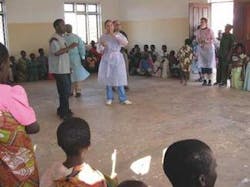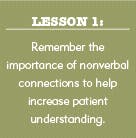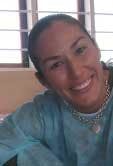Perhaps we can be the change we wish to see in this world, as Mahatma Gandhi once said.
Even after traveling for nearly 24 hours to reach our destination, I was still awestruck when I stepped off the bus into a rural village in sub-Saharan Africa to begin our weeklong dental outreach. Amidst lively music, song, dance, and curious faces peering at our collection of foreigners - and more than 30 oversized duffel bags of donated dental supplies from Henry Schein Cares, the global corporate citizenship program of Henry Schein - we began a dental outreach that brought us deep into the interior of Tanzania to the town of Songea. This rural village in the southwest quadrant of the country has just two dental practitioners and three dental assistants to serve a community that government officials estimate exceeds 1.2 million.
As a fourth-year dental student at New York University’s College of Dentistry, my life has been full of learning experiences, but none as powerful or empowering as my first dental outreach. It not only gave me an opportunity to grow personally and professionally, but it also allowed me to help increase dental access to underserved populations around the globe. This is the third consecutive dental outreach to Songea resulting from the efforts of Miracle Corners of the World, a nonprofit group that organizes and develops initiatives to create sustainable development solutions in remote areas of the world, while partnering with the professional and private support of institutions like New York University’s College of Dentistry and Henry Schein, Inc.
Erica Barba, center, uses Henry Schein toothbrushes to demonstrate proper brushing techniques to a group of more than 50 school children in Songea, Tanzania. Ms. Barba, a senior dental student at New York University’s College of Dentistry, was part of a team of 11 international dental professionals who spent a week providing free dental treatment and screening to rural villagers, the average of which live on $0.60 per day. Henry Schein Cares, the global corporate citizenship program of Henry Schein, supported the outreach initiative for the third consecutive year through the donation of products and supplies.
On this outreach, I was able to play a role in treating nearly 500 rural African villagers during our weeklong stay. But embarking on an outreach such as this isn’t easy due to the obstacles the developing world faces regarding access to care. Here are a few of the lessons I learned during my first outreach adventure:
• Remember the importance of nonverbal connections to help increase patient understanding. Being in a country where the language and culture are completely different poses challenges, particularly when performing or supporting painful procedures, such as extractions or surgical procedures. In areas where very few people speak English, understanding, patience, and genuine care are important attributes in transcending these barriers. Remember that caring about what you do - and the people you treat - will go much further than even the assistance of translators. You don’t need to speak the same language to convey empathy, caring, and understanding for patients. People are still people despite any language barrier.
• Become aware of local cultures, values, and mores, and consider them while treating patients. I was lucky to partner with a nonprofit group like Miracle Corners of the World, which has worked to develop relationships with key stakeholders in local, national, and international circles to help further the issue of access to care in remote areas of the world. But it’s also just as important for each individual practitioner to do his/her own homework about what is considered appropriate in the countries he/she is visiting. My patients humbled me - not only by their patience in waiting for hours to receive free medical treatment, but also by their ability to withstand pain (i.e., surgical extractions with just local anesthesia) and their gratitude for the care they received. It is also important to understand cultural norms to further build support within the country and its stakeholders for the work you’re about to do. For instance, the continent of Africa has one of the highest prevalence rates for HIV infection in the world. When we first began our dental outreach, one of the questions on the patient health survey asked about HIV/AIDS infection. After discussions with local health officials, we learned that disease stigma in the country - and its repercussions on an individual’s personal and professional spheres - mandated that we remove this question from the patient survey. The bottom line is, you have to understand your patients if you wish to help change their behavior, which will ultimately enable them to better care for their teeth and improve their nation’s oral health.
• Find good partners who understand the inherent struggles of increasing access in the developing world, and mobilize resources to support your efforts. I was lucky to have the guidance of outstanding NYUCD professors, whose experience covered all areas of practicing dentistry. They guided me through countless extractions, fillings, and other procedures. It was also crucial to have the support of groups from public and private sectors to increase treatment, screening, and educational efforts in the area. In my case, Henry Schein Cares, which works to help increase access to care in underserved communities, provided the resources not only to support the dental outreach program, but also to further supplement the programs of the region’s community-based health-care professionals, many of whom operate under harsh conditions with few resources.
• Remember that learning is a two-way street. Not only was I humbled by my patients, but time and time again I had the opportunity to share information with each of my four student colleagues and the group of six dentists - which included three practitioners from New York University, one from the National Dental Association, and two from South Africa - who brought to the expedition a wide range of experience, knowledge, and understanding. Through this rich cross-collaboration, I increased my understanding of international oral health delivery, practice, and safety, as well as improved my dexterity in performing dental procedures and treating patients.
As I enter the dental profession, my primary goal will remain to serve underprivileged communities in the United States and abroad. The lack of knowledge and availability of safe, effective, and high-quality dental care is a problem that can be remedied with the commitment of talented medical personnel and the support of committed groups.
Outreaches such as this are a perfect example of how the public, private, and professional spheres can work together to mobilize resources to help make a difference in access to care.
Perhaps, as Mahatma Gandhi once said, we can be the change we wish to see in this world.
Erica Esbeicy Barba
Ms. Barba is a senior at New York University’s College of Dentistry, where she is currently a National Health Service Corps scholar. She obtained her bachelor’s degree in human development from the University of California, San Diego. Contact Ms. Barba at [email protected].









